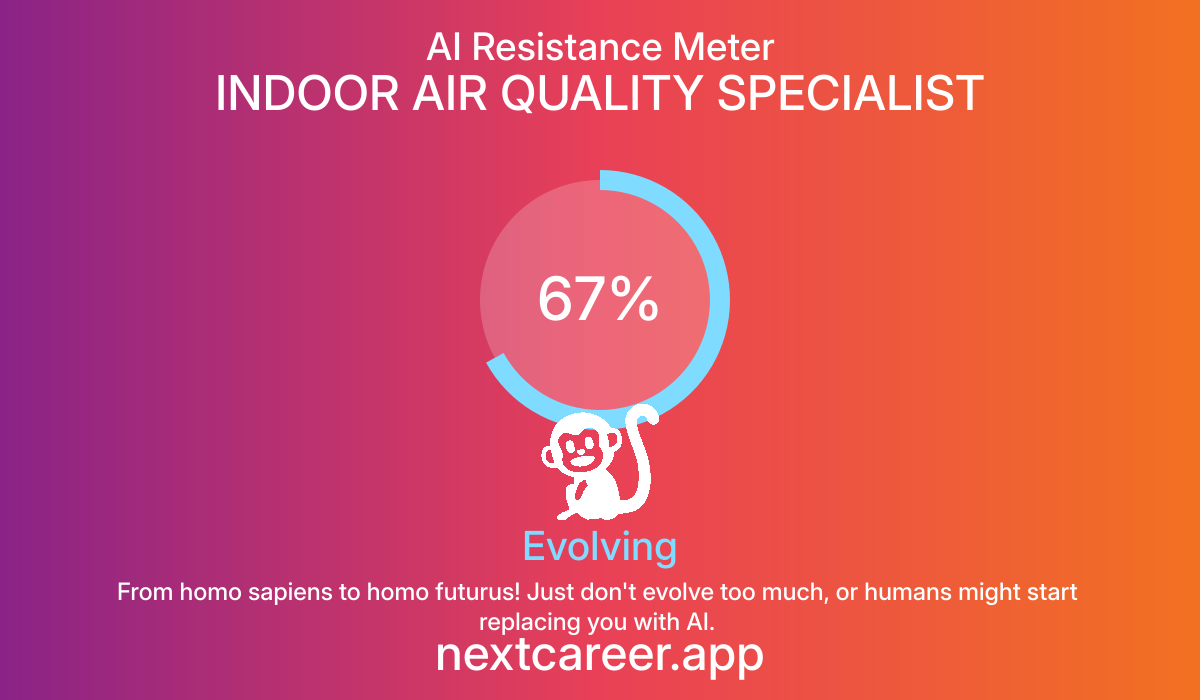AI Resistance for INDOOR AIR QUALITY SPECIALIST
AI Resistance Score
AI Resistance Meter
Evolving
INDOOR AIR QUALITY SPECIALIST
You're upgrading faster than a computer from the 90s! Just remember, even flip phones thought they were the pinnacle of evolution once.
Indoor Air Quality Specialists play a critical role in ensuring the health and safety of building occupants by assessing, diagnosing, and mitigating air quality issues. The role involves a combination of scientific evaluation, regulatory compliance, and customized solutions to address specific environmental conditions. While some aspects of data collection and initial analysis can be automated with AI and IoT devices, the nuanced interpretation of results, decision-making for complex situations, and interaction with diverse stakeholders require a human touch. AI tools may enhance these professionals' efficiency, but the personalized and contextual analysis remains essential, thereby providing moderate to high resistance against full automation.
Indoor Air Quality Specialists play a critical role in ensuring the health and safety of building occupants by assessing, diagnosing, and mitigating air quality issues. The role involves a combination of scientific evaluation, regulatory compliance, and customized solutions to address specific environmental conditions. While some aspects of data collection and initial analysis can be automated with AI and IoT devices, the nuanced interpretation of results, decision-making for complex situations, and interaction with diverse stakeholders require a human touch. AI tools may enhance these professionals' efficiency, but the personalized and contextual analysis remains essential, thereby providing moderate to high resistance against full automation.
Key Factors
- Cognitive Tasks: AI can assist in data analysis but lacks the contextual understanding for unique environmental conditions.
- Emotional Intelligence: Client interactions and communication require understanding and empathy, where AI struggles.
- Physical Skills: Fieldwork components like sampling may be automated, but interpretation remains human-centric.
- Creative Thinking: Developing tailored solutions for air quality issues requires innovation and human insight.
Human Advantages
- Deep understanding of client-specific needs, especially in regulatory and health contexts.
- Communication and negotiation skills to manage expectations and collaborate with multidisciplinary teams.
AI Vulnerabilities
- Data analysis and pattern recognition are increasingly sophisticated in AI systems.
Recommended Actions
- Develop skills in AI and data interpretation to effectively use emerging analytical tools.
- Enhance capabilities in communication and stakeholder engagement to leverage the human-centric aspects of the role.
- Stay informed about emerging environmental technologies and regulations to provide cutting-edge solutions.
- Foster interdisciplinary knowledge, particularly in fields like public health and advanced materials, to bring integrated solutions to clients.
In the near-term, AI will increasingly assist with monitoring and diagnosing routine air quality issues through IoT sensors and analytical software, enhancing efficiency and data accuracy. Specialists will likely focus more on interpretation, problem-solving, and client engagement. In the long-term, while AI may handle standard environments autonomously, specialists will deal with complex or new situations requiring integrated human judgment. Increasing environmental regulations and public health concerns will bolster the role, possibly integrating with advanced technologies like real-time monitoring through nano-bio sensors.
